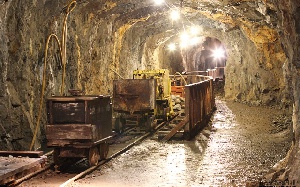Professor of Engineering at the University of Mines and Technology (UMaT) – Tarkwa, William Buah has acknowledged the country’s mineral industry as the foremost source of revenue generation, with prestigious status on contributing significantly to national growth.
He said statistics from the Ghana Revenue Authority (GRA) show that the minerals and mining sector is the major source of direct domestic revenue mobilised by the Authority in 2017, with overall total mining fiscal receipt mobilised by GRA increasing by 31 percent year on year – from GH¢1.65billion in 2016 to GH¢2.16billion in 2017.
Delivering the second public lecture in Accra to mark the 90th anniversary celebration of the Ghana Chamber of Mines, under the theme ‘A Responsible and Sustainable Mining Industry, a Partner for National Development’, Prof. Buah contended that the mining industry’s contribution to national development can be directly linked to national revenue generation, corporate social investment programmes of the industry, and sustainable alternative livelihood programmes.
He added that the mining industry is committed to responsible and sustainable mining practices, and therefore is positioned to continuously support national development.
“The industry’s fiscal contributions to Direct Domestic Tax Revenue from 2011 to 2017 have been consistent.”
He emphasised that corporate income tax receipts increased from GH¢696.9million in 2016 to GH¢969.6million in 2017, while mineral royalty revenue grew from GH¢550.7million to GH¢702.4million over the same period. These represent an increment of 39 percent and 28 percent respectively.
Employee income tax (pay-as-you-earn), he indicated, also increased by 22 percent to GH?487.9million in 2017 as compared to GH?399.9million in 2016.
Prof Buah stated that gold exports increased from 3.84 million ounces in 2016 to 4.61 million ounces in 2017, which he attributed to the upturn in output of large-scale producers, increase in volume of gold exported by Licenced Gold Exporting Companies; and exports of manganese increased from 2 million tonnes in 2016 to 3 million tonnes in 2017.
Meanwhile, bauxite also expanded from 1.14 million tonnes to 1.47 million tonnes over the same period, he stated.
“It has also emerged that the Minerals and Mining sector is the leading source of foreign exchange for the country from the export of commodities. The share of mineral receipts in total merchandise export for 2017 was 43 percent, while proceeds from the country’s major export commodities – cocoa and oil – accounted for 19 percent and approximately 23 percent respectively of merchandise export revenue in 2017.
“In essence, receipts from the export of gold were slightly higher than the sum of receipts from cocoa and oil put together in 2017.”
The main objectives of the industry’s Corporate Social Investment (CSI) programmes, Prof Buah said, are to support the training and development of local people in engineering, construction, electrical and other technical fields; and to provide support for research and charitable projects that are beneficial to the host communities and entire nation.
Chief Executive Officer of the Ghana Chamber of Mines, Sulemanu Koney, underscored the need to ring-fence revenues accruing to the state from the exploitation of minerals and mining resources.
This, he said, has come to the fore following the people’s inability to properly track contributions of the sector to the country’s national economy.
He indicated that though the mining sector has significantly contributed to the country’s development over the years, its contribution cannot be properly traced because the revenues mostly end up in the consolidated fund.
He is of the view that ring-fencing mineral revenues is the best way to assess the mining sector’s contribution to the economy, whereby the benefits which have been accruing to the state and mining communities can be properly evaluated.
Making a strong case for measures to be put in place to enhance transparency and accountability of the country’s natural resources-administration/exploitation, a Member of Parliament for the Tarkwa-Nsuaem constituency, George Mireku Duker, said that such a move will enable the state to prove the value of mining to the people.
Business News of Saturday, 1 December 2018
Source: bftonline.com













